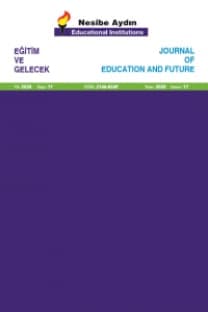Active Learning Methods and Techniques Preferred by Teacher Candidates
___
- Aydede, M. N., Çağlayan, Ç., Matyar, F., & Gülnaz, O. (2006). Fen ve teknoloji öğretmenlerinin kullandıkları öğretim yöntem ve tekniklerine ilişkin görüşlerinin değerlendirilmesi. [Evaluating the viesws of science and technology teachers about teaching methods and techniques they use].Çukurova Üniversitesi Eğitim Fakültesi Dergisi [Çukurova University Journal of Faculty of Education], 3(32), 24-33.
- Aydın, A. (2003). Gelişim ve öğrenme psikolojisi [Psychology of development and learning]. İstanbul: Alfa Publishing.
- Büyükkaragöz, S. S., & Çivi, C. (1999). Genel öğretim metotları [General teaching methods]. İstanbul:Beta Publishing.
- Demirel, Ö. & Ün, K. (1987). Eğitim terimleri[Education terms]. Ankara: Şafak Publishing.
- Demirel, Ö. (2003). Türkçe Öğretimi [Teaching Turkish Language]. Ankara: Pegem Publishing.
- Demirel, Ö. (2006).Ögretimde planlama ve değerlendirme öğretme sanatı [The art of teaching planning and evaluation in teaching]. (10st Ed.). Ankara: PegemA Publishing.
- Erden, M. (1997). Sosyal bilgiler öğretimi [Teaching social studies], Ankara: Alkım Publishing.
- Ergun, M. (1999). Öğretmenlik mesleğine giriş [Introdustion to teaching profession]. Ankara: Ocak Publinshing.
- Halat, E. et. al. (2006). Matematik öğretimi [Teaching Mathematics]. İstanbul: Lisans Publishing.
- Küçükahmet, L. (2000). Öğretimde planlama ve değerlendirme [Planning and Evaluating in Teaching]. Ankara: Nobel Publishing.
- Oğuzkan, F. (1989). Orta dereceli okullarda öğretim: Amaç, ilke, yöntem ve teknikler [Teaching in secondary schools: Objectives, principles, methods and techniques]. Ankara: Emel Publishing.
- Saracaloğlu, A. S. (2003). Öğretimde planlama ve değerlendirme [Teaching planning and evaluation in teaching]. Aydın: Adnan Menderes University.
- Snowman, J. (1986). Learning tactics and strategies. (Editors: Phye, G.D. and Andre, T.). Cognitive classroom learning: Understanding, teaching and problem-solving. New York: AcademicPres, Inc.
- Şahin, Ç. (2004). İlköğretim okullarında görev yapan öğretmenlerin kullandıkları öğretim stratejileri [Teaching strategies used by teachers working in primary schools]. İnönü Üniversitesi Eğitim Fakültesi Dergisi [Inönü University Journal of Faculty of Education], 5(8), 12-19.
- Tan, Ş. (2007). Öğretim ilke ve yöntemleri [Teaching principles and methods]. Ankara: PegemA Publishing.
- ISSN: 2146-8249
- Yayın Aralığı: 1
- Başlangıç: 2012
- Yayıncı: Nesibe Aydın Eğitim Kurumları
Eda GÜRLEN, Tuğba CİHAN, Nuri DOĞAN
Gönül ONUR SEZER, Pınar BAĞÇELİ KAHRAMAN
Ayşegül BAYRAKTAR, Seher YALÇIN
Mustafa YAVUZ, Tuğba Cevriye ÖZKARAL
Alper YETKİNER, Ceren KARADENİZ, Zekiye ÇILDIR GÖKASLAN
Şenol ŞEN, Lütfiye VAROĞLU, Ayhan YILMAZ
Nazire Burçin HAMUTOĞLU, Merve SAVAŞÇI, Gözde SEZEN-GÜLTEKİN
